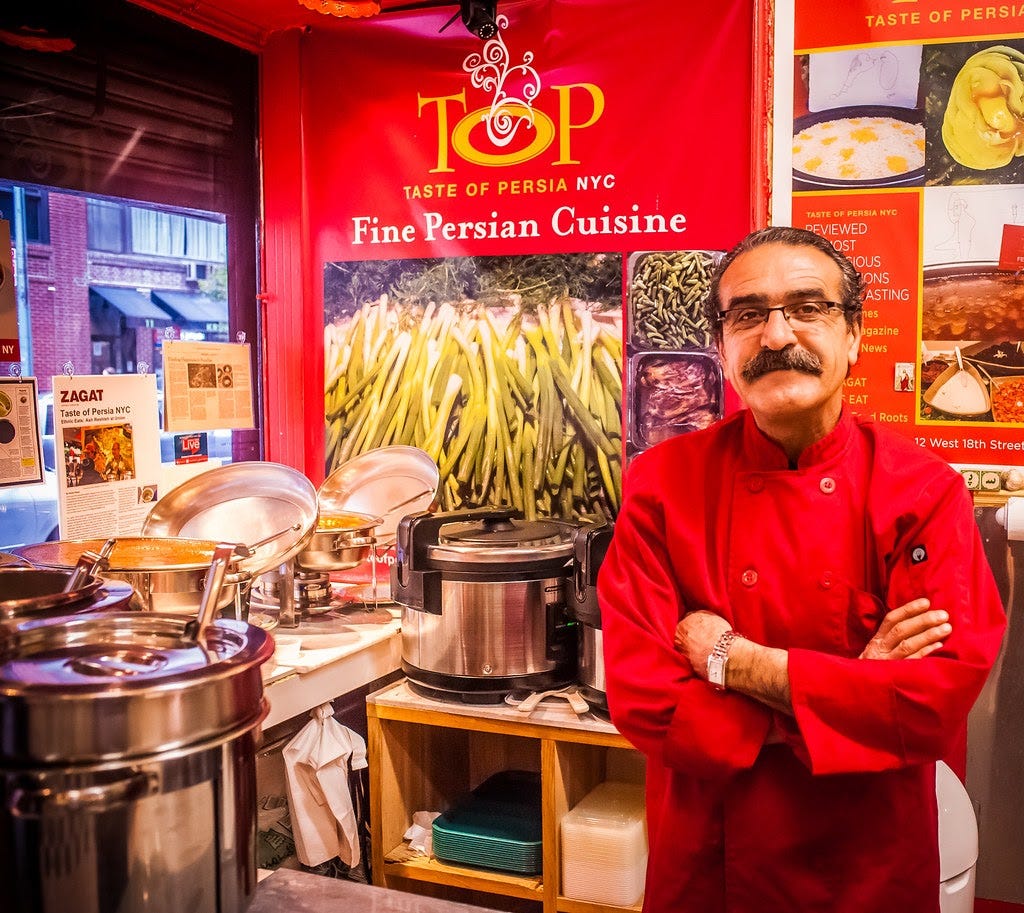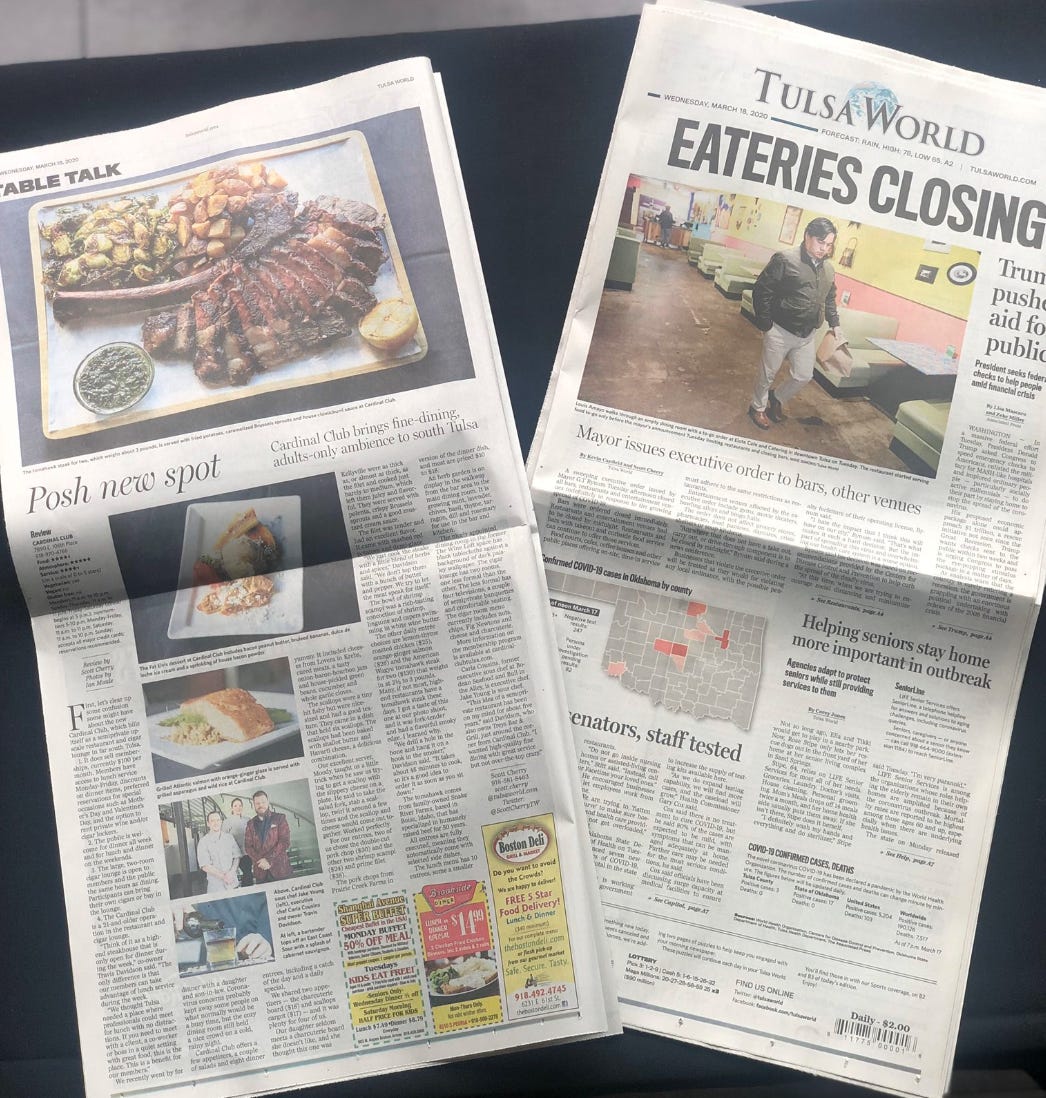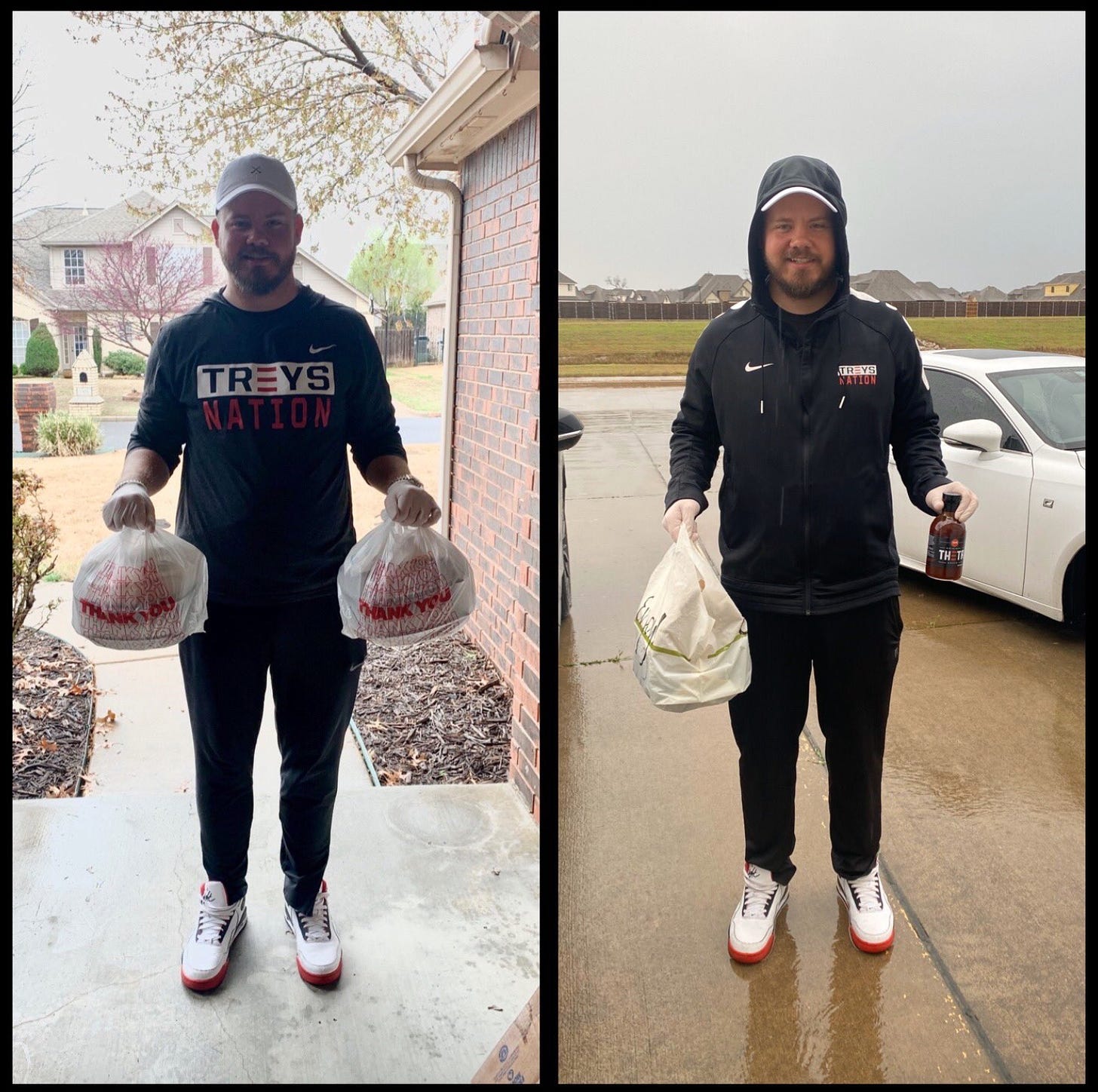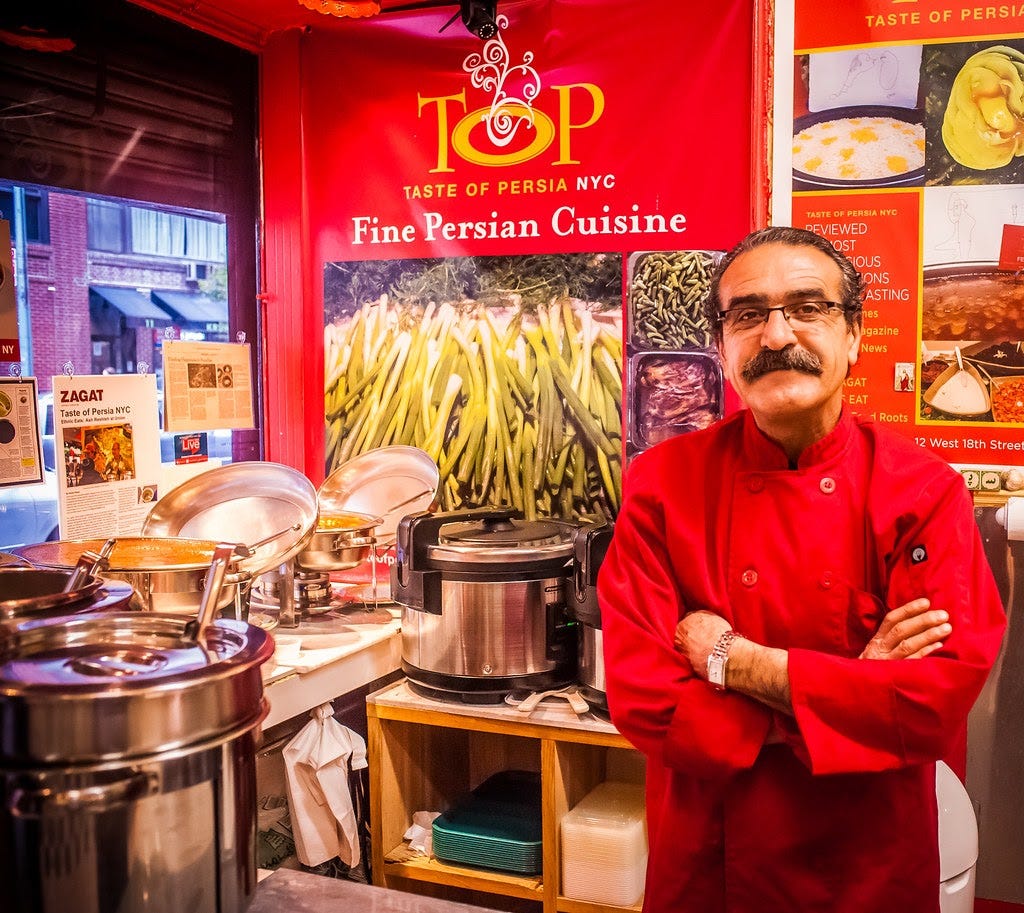Don't just cook. Support local restaurants.
Plus: A "neo-Hegelian bread recipe," whatever that means.

Since Cooking in Quarantine launched last week, we’ve spoken to three Iron Chefs, the world’s preeminent pizzaiolo, the best chef in the South, the Willy Wonka of Ice Cream, and the eponymous Ivan of Ivan Ramen. If you haven’t read those interviews yet, I hope you do.
But over the past seven days, as I’ve been writing about what the best chefs in the world cook at home, restaurants across the country have been decimated. Millions of waiters, bartenders, hosts, dishwashers, and line cooks are out of work. And even as our government prepares to spend hundreds of billions of dollars bailing out cruise lines, the restaurant industry has yet to be promised a lifeboat.
With this in mind, I want to start the second week of Cooking in Quarantine by telling you about two guys who are doing their best to stay afloat in these choppy waters. (I have no idea, for the life of me, why I’ve stuck with this nautical metaphor for so long.)
The first is Travis Davidson, who owns two restaurants in Tulsa, Oklahoma, which were shut down this week: Trey’s Bar & Grill and Cardinal Club. The other, Saeed Pourkay, was forced to close his legendary stand, Taste of Persia, before COVID-19—and now has no idea when he’ll be able to reopen.
There will be a few recipes in this letter, as there are in all of them, but for today, I am focusing less on what you can cook at home—and more on why we all need to be there for the restaurants that have always been there for us.
Don’t worry: We will be back to regularly scheduled programming tomorrow. (And at the end of this letter, I’ve included some good reads—and a neo-Hegelian bread technique. Whatever the fuck that means.)
Editor’s Note: If you want to eat at your favorite restaurant when all of this is over, you should call your representative and senators at 202-224-3121 and demand they do right by small businesses like restaurants, just like they would if big banks were the ones in trouble.
How Travis Davidson is delivering for Tulsa
Wednesday should have been one of the best days of Travis Davidson’s career. His brand new restaurant, Cardinal Club, received a glowing review from his hometown newspaper, the Tulsa World. Four and a half stars for the food and service. Five out of five for the atmosphere. Normally, with a review like this, Cardinal Club would be preparing for its best ever week. But Tulsa residents were more focused on the headline printed on the newspaper’s front page:
“EATERIES CLOSING.”

Like many cities in the U.S., Tulsa ordered all restaurants and bars shut—except for takeout and delivery service. Across the country, these moves have forced businesses to let go of most of their employees, but Travis is doing everything he can to stop that from happening. “I have expecting mothers, single moms, and single dads working for me,” he explained, “and I just refuse to give in.”
So Travis is driving around Tulsa himself, dropping off food to whomever orders it, and donating the proceeds to a relief fund, which he will use to pay his employees. “I just want it to look like a regular payroll,” he told me, “because so much of America can’t go a week without pay, especially restaurant employees.”

The rain won’t stop Travis from dropping off deliveries. And nothing, he says, will get in the way of him from doing everything he can to make sure his employees are paid. But he might need help. That’s why he’s set up GoFundMe pages for each of his two restaurants: Treys Bar & Grill and Cardinal Club. And if you can, I hope you join me in donating to them.
“We do a lot of non-profit work,” Travis told me, “and it’s kind of weird to be on the other side of it.” Every month, for instance, Treys has a “Give Back Burger” on the menu, whose proceeds go to a local charity. In November, for instance, they “went a little weird, and did a Thanksgiving burger, which was like a grilled turkey burger with arugula, cranberry sauce, and cream cheese.” Profits went to an organization called Little Lighthouse Tulsa, which supports students with special needs.
Now, Travis is counting on his neighbors to give back to him. “I think I’m gonna try my best to put my faith in the hands of the community, as opposed to the government or the banks,” he told me. And, he added, restaurants still have a lot to offer the community in return—beyond delivery and takeout—even though table service is shut down.
“If restaurants are delivering in your area,” he says, “ask them if they can spare supplies. Keep in mind that these places don’t have walk-in traffic anymore, so a lot of our supplies are going unused.”
He concluded: “I just delivered an order of wings, fries, 2 bottles of Cabernet, and a roll of toilet paper.”
Why Saeed Pourkay still believes spring is coming

Saeed doesn’t remember the first time we met. I was standing outside in the winter cold with my friend Tim at Union Square Holiday Market—where most things are overpriced. $6 for a cup of apple cider. $8 for a plate of pierogies. $5 for a hot chocolate. But Saaed handed us a cup of ash reshteh for free. When we tried to pay, he refused.
My friend Tim had been coming to his store since he was a kid—and Saaed didn't care how much cash Tim had in his wallet. He simply wasn’t going to accept it. “I’m not a good businessman,” Saeed concedes. “But the same way I cook from my heart, sometimes I have to give away things. That’s my nature. Money is not that important.”
Turns out, the way you treat others isn’t always the way you will be treated. As The New York Times reported, a few months ago, Saeed was kicked out of the tiny corner of a pizzeria on 18th street, where he served ash reshteh and fesenjan for seven years. His stand, “Taste of Persia,” was replaced by a knockoff, called “Tasty Persia,” prompting a wave of outrage.
Saeed launched a GoFundMe to re-open his restaurant—which has raised $68,000—and he will set up shop as soon as he possibly can, but the pandemic has been a real setback. He no longer knows if it makes sense to start a new lease. And Saeed had been looking forward to getting back on the horse at pop-ups in the coming weeks, three of which have now been cancelled, leaving him with hundreds of pounds of vegetables at his home.
He’s been using them to make quiches—and “eggplants that I make myself, with cashew butter in a jar, with walnuts, mint, onions, and whey.” The eggplant “doesn’t go bad,” he says, “and you can keep it for easily six, seven days in your refrigerator.”
Read: Bon Appetit’s recipe for Eggplant with Cashew Butter. As Alex Guarnaschelli, Anthony Mangieri, and others have noted in the newsletter, produce still seems to be in full stock at supermarkets, so buy up as many eggplants as you can! (Actually, though: Don’t do that. Leave some for other people to buy. Just purchase enough eggplants to make, like, a few servings of this dish.)
And, he says, he has a lot of “fesenjan” that he made prepping for these events, which he has been bringing to his friends across Brooklyn. “I gave a pint to everybody,” he told me. And he says it’s “very easy to make if you have walnut and pomegranate at home, and molasses.” “If you don’t,” he adds, “you can use tomato paste.”
READ: A home recipe for Fesenjan, the Persian walnut and pomegranate stew for which Saeed famous.
When I asked Saeed why he’s been handing out his fesenjan for free all over Brooklyn, he told me he just “loves to help people out,” even though he doesn’t “make any money right now.” And while America, the country where he lives, and Iran, the country he’s from, are suffering, he’s holding out hope that things will get better.
“I pray for everybody,” he told me. “We’re all waiting for a better time. And spring is coming.”
Homecooking Hacks

“Do you spend more time cooking in quarantine or preparing the newsletter cooking in quarantine?”
This is what my funniest friend, Elliot Schiff, texted me, before bragging about having cooked a ciabatta from scratch—and imploring me to mix by hand when making bread at home. “Now is a good time to engage with the materiality of baking and take a good opportunity to cook and bake slow rather than fast,” according to Elliot, who seriously used the word “materiality” in a text.
“For breads, put the stand mixer away while we are quarantined and don’t have anything better to do. You’ll feel more proud of the bread once it’s ready. And it’s not forced Hegelian triumph through suffering, it’s labor that actually affects both the taste and experience of the bread.”
Editor’s Note: I don’t know what a Hegelian triumph is, probably because I didn’t do enough of my philosophy readings in college, but I’m on board with ciabatta crafted with love. Elliot’s recipe came from a cookbook called “Bread on the Table,” but I also trust Mark Bittman’s No Triumph Through Suffering Bread (neé “No-Knead Bread”), which my other friend, Sean, praised in the Nina Compton issue of the newsletter.
Good Reads
*Check out this great article by Jenny Zhang on why we stress-bake in times of crisis. Quote: “Everyone deserves a coping mechanism that lends some sense of structure in a chaotic world.”
*The New York Times has released a super helpful guide of “easy recipes to cook while you’re self-quarantined,” including Pasta Tahdig from Samin Nosrat and Ramen Carbonara from Julia Moskin. (Sorry, I’m a big carb guy. I’m sure they also have wonderful recipes that won’t raise your cholesterol. I just don’t happen to be interested in those.)
*Also, check out this sage wisdom from Alton Brown:

Amazon may be sold out of toilet paper, but they still have plenty of gin...
...for now.
Until next time...



